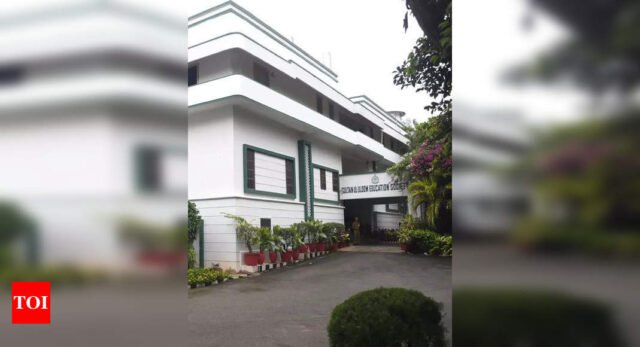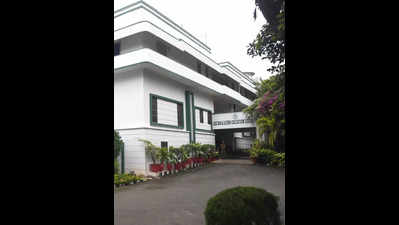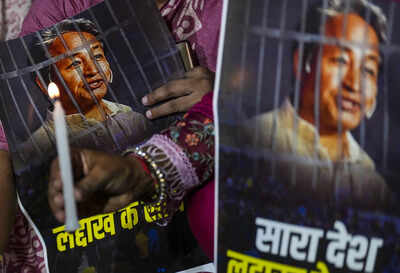Hyderabad: Exactly 70 years after it was bought, one of Hyderabad’s most expensive royal homes, Mount Pleasant — sprawled in the middle of the city’s rich Banjara Hills neighbourhood — is caught in a fierce ownership battle.
The two key contenders: Sultan ul-Uloom Education Society (SUES) that’s been running a chain of institutions from this premises for the last 44 years and businessman S V Naga Raja Reddy who insists that a large part of this property is ‘no man’s land’. Six acres of it, Reddyclaims, belongs to him.
Bought for about Rs 20 lakh in 1954 to house Moazzam Jah and his wife — son and daughter-in-law Hyderabad’s seventh Nizam, Mir Osman Ali Khan — this prime piece of real estate is, conservatively, valued at Rs 3,000 crore in Hyderabad’s open market today.
But who is the rightful owner of this multi-crore asset that once belonged to the family of the world’s richest man?
The last few decades have seen multiple parties — including a string of distant descendants of the Nizam and private buyers –come forward to claim their ‘pound of flesh’ in the pie.
And while, through it all, the land has remained in the custody of the SUES, a recent court ruling has thrown this status quo off balance.
On Nov 12, the Telangana high court refused to stay a previous order on SUES making way for the All-India Council for Technical Education (AICTE) to slap a ‘no admission’ order on the engineering college, run by SUES on a portion of this land for the last 44 years.
The central body’s argument: SUES failed to show proof of ownership of the premises, as is mandatory under AICTE norms.
Though SUES still maintains that the property is rightfully theirs and claim that they bought it from the Moazzam Jah Trust, set up by Osman Ali Khan for his son (Moazzam Jah), in 1980, businessman Reddy who first dragged the education society to court, has a different argument. According to him, barring the six acres that is his – he claims to have bought it from Moazzam Jah’s son and sole heir, Shahmat Jah, in 1995 – the rest belongs to no one.
Especially since Shahmat Jah died in 2023.
“Prior to us, the property was with Bharat Heavy Electricals Limited. In 1980 it was transferred to us to start our engineering college. However, due to an urban land ceiling glitch, (A 1976 Act that restricted ownership of land beyond a certain size with one individual. The SUES sort exemption citing it was running a minority institution) we could never register the land and execute a sale deed,” said Zafar Javeed, honorary secretary of the SUES, sharing supporting documents with TOI which states that the sale was fixed at Rs 67 lakh. “But the trust did not encash one cheque of Rs 15 lakh (approx.) from it. So, we later paid Rs 1.54 crore (along with interest) to them to settle accounts,” Javad added.
He said that SUES has appealed against the court’s recent ruling in favour of AICTE and is confident that the land and the institutions operating out of the premises are both “safe” with them. There are no other claimants to the property — private parties or members of the Nizam’s family — he asserted.
Currently, about 11,000 students are enrolled in the different colleges run by SUES.
“How can they claim right over the land when they do not have a sale deed?” asked Reddy, showing documents of a sale deed between him and Shahmat Jah in 1995. According to it, he bought six acres of this land from the latter for roughly Rs 4 crore.
According to his version – and papers that he shared with TOI – the land belonged to Shahmat Jah after members of the Moazzam Jah Trust handed it over to him in 1995. “Except for the main building Mount Pleasant that was only covered by agreement of sale between the trustees and SUES, the rest of the property was handed over to Shahmat Jah. But that he has died, and has no heirs, it is yet to be ascertained who the owner(s) of this property is – albeit excluding my share,” Reddy added.
His claim is vehemently denied by SUES.
“The property has always been with the trust. And the dealings, therefore, must be through it and not an individual. Also, all claimants including Shahmat Jah have given submissions in court stating that they have withdrawn their claims over the property. So, there’s no conflict,” Javeed maintained. He also shared that SUES has filed a vacate plea against the order that denied them exemption under ULC.
“If that comes through, then there’ll be no doubt over ownership as a sale deed can be executed,” he added.
His opponent, of course, is sure of no such luck coming the society’s way.








